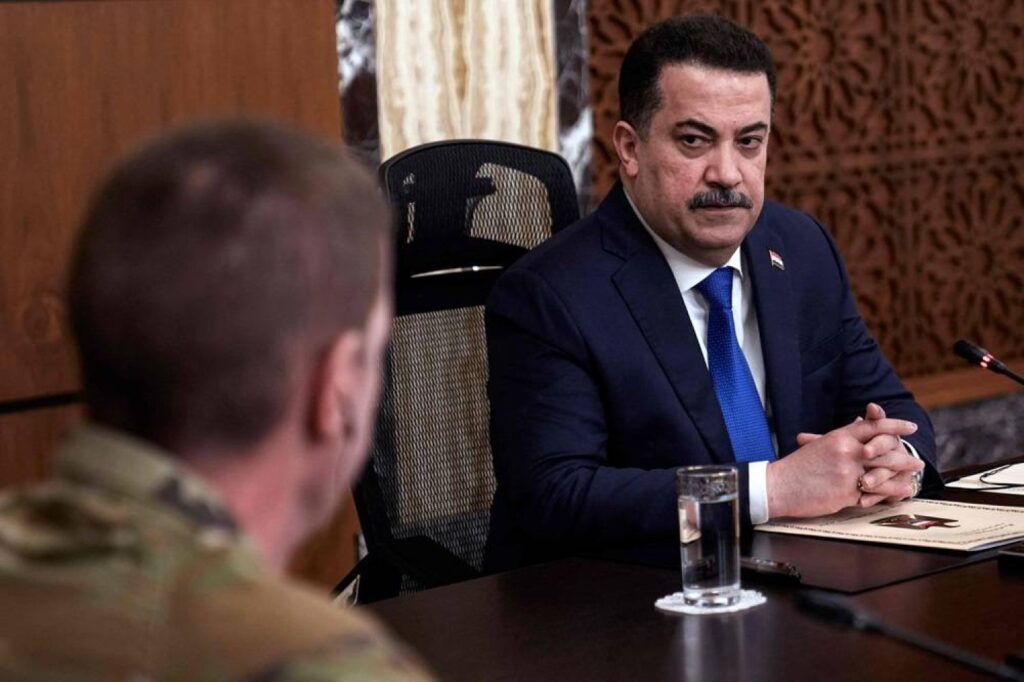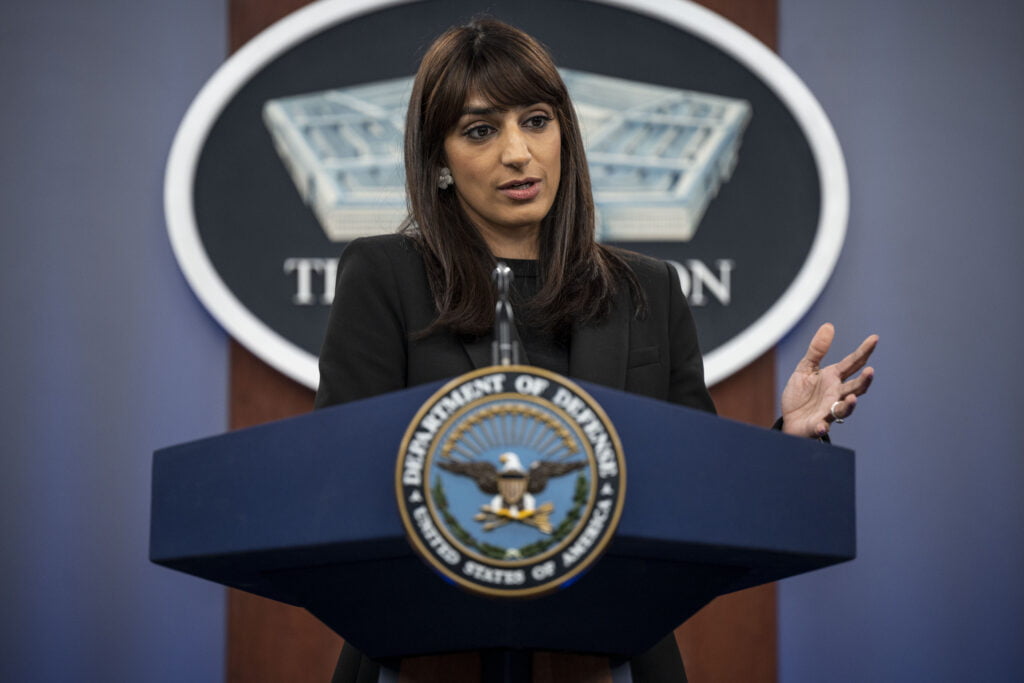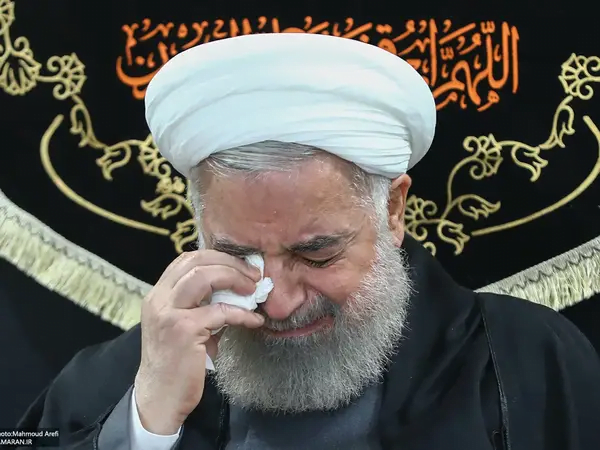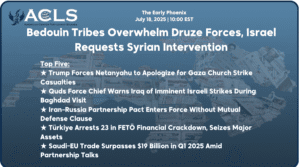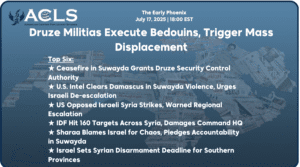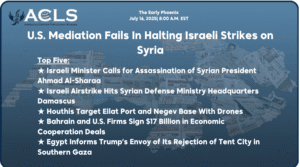U.S., UK Sanction Iran Proxies; Set Iraq Troop Terms; Intercept Yemen Missile
TOP HEADLINES:
- U.S. Suspends UNRWA Funding
- USS CARNEY Intercepts a Houthi Missile
- U.S. Sets Conditions for Iraq Troop Withdrawal
- Israeli Raids Disrupt Iranian Investments in Syria
- US and UK Impose Sanctions on Iran Proxy Networks
=======================
★ Yemen
- USS CARNEY Intercepts a Houthi Missile. On January 26, the USS Carney, an Arleigh-Burke class destroyer, intercepted a Houthi-launched ballistic anti-ship missile in the Gulf of Aden, marking an escalation in Houthi maritime aggression. Concurrently, a commercial vessel near Aden reported a separate Houthi attack. The rising threat has led to insurance companies halting coverage for ships from the U.S., Israel, and Britain in the Red Sea, compelling rerouting and surging insurance costs. These developments have drawn international attention, with China urging Iran to control Houthi actions, and a Houthi delegation discussing U.S. and British involvement in Yemen with Russian officials in Moscow. These incidents underscore the growing navigational risks in the region, with implications for international trade and regional stability.
=======================
★ Iraq
- U.S. Sets Conditions for Troop Withdrawal in Official Letter to Iraq, Signals Waning Patience.

The United States sent an official letter to the Iraqi government laying out Washington’s formal conditions for a withdrawal of US troops from Iraq. Arabic media sources said the letter, which was formally delivered by U.S. Ambassador Alina Romanowski, stunned Iraqi leaders and prompted urgent meetings within the Iraqi government and the Hashd parties to discuss what they described as a “sudden [American] move.”The US letter indicates that Washington’s patience with Baghdad is running out as many in the US have grown unhappy with the Iraqi government’s failure to stop IRGC and Hashd attacks against US troops and diplomats in Iraq.

It also appears to be Washington’s warning that if the Iraqi government decides to push for the withdrawal of US troops, then the United States will no longer consider itself obligated to shield Iraq from Iran-related sanctions or to facilitate the Iraqi government’s financial interests, as it has been doing for many years.
Deputy Pentagon Press Secretary Sabrina Singh conducts a press briefing at the Pentagon in Washington, D.C., Jan. 25, 2024. (DoD photo by U.S. Navy Petty Officer 1st Class Alexander Kubitza) At the same time, the US Pentagon insisted on characterizing the upcoming US-Iraqi talks as discussions about the US-Iraq strategic relationship, and not about the withdrawal of US forces.
- US and UK Impose Sanctions on Iran Proxy Networks. The United States and the United Kingdom have implemented new sanctions targeting the financial and logistic support networks of Iran’s proxy groups. The US Department of the Treasury’s Office of Foreign Assets Control (OFAC) designated Iraqi airline Fly Baghdad and its CEO for aiding the operations of Iran’s Revolutionary Guard’s Qods Force (IRGC-QF) and its militia groups in the region. This includes support for Kata’ib Hizballah (KH), a militia in Iraq officially listed as a terrorist organization by several countries. The sanctions also affect three leaders and supporters of KH, and a business involved in fund transfers for the group. Fly Baghdad is accused of transporting weapons and fighters to support IRGC-QF and its proxies’ regional activities, including attacks against Israel and US personnel.
- Iraqi Resistance Targets U.S. Interests. In a coordinated strike on January 26, the Islamic Resistance in Iraq executed a drone attack on Ain al-Asad base, a key U.S. military site in the country’s west. Concurrently, an explosive drone hit Khor Mor gas field in Iraq’s Kurdistan Region on January 25, causing a temporary halt in production. A video released by the group illustrates the drone launch from near Erbil Airport. U.S. Ambassador Alina Romanowski denounced these assaults, citing significant infrastructure damage and widespread power outages amid winter conditions. The Khor Mor and Chamchamal fields, among Iraq’s largest gas reserves, were targeted in another missile strike, causing property damage but no reported casualties. These attacks underscore rising tensions and highlight vulnerabilities in key energy and military locations.
=======================
★ Iran
- Iran Escalates Crackdown on Hijab Non-Compliance. Iran’s Chief Justice Gholamreza Mohseni-Ejei has directed prosecutors to aggressively address ‘organized’ violations of the country’s mandatory hijab laws. This increased enforcement, characterized by rising numbers of vehicle impoundments and business shutdowns, reflects concerns from top clerics about declining hijab adherence. This enforcement surge underscores deep societal tensions over national identity and governance, as Iran grapples with challenges to its traditional social norms.
- Iran’s Execution of Protestor Sparks Global Outrage and Calls for Accountability. Iran’s execution of Mohammad Ghobadlou, the ninth young man executed for involvement in the 2022 protests, has ignited widespread condemnation from Iranians and international human rights groups, labeling it as “state-murder.” Mahmoud Amiry-Moghaddam, director of Norway-based Iran Human Rights (IHR NGO), criticizes the execution as extrajudicial and calls for accountability of Iran’s Supreme Leader and judiciary. Human rights organizations, including the Center for Human Rights in Iran and Amnesty International, have condemned the execution, citing Ghobadlou’s disability, torture, and secretive trial proceedings.
- Iran Expands Drone Operations, Impacts Red Sea Shipping. Iran is significantly enhancing its drone capabilities, impacting maritime security in the Red Sea region. Recent reports indicate the launch of the Shahid Bagheri, a drone carrier capable of deploying a large fleet of long-range drones. This development, coupled with Iran’s support of the Houthis in Yemen targeting merchant vessels, escalates regional tensions. Additionally, Iran’s drone supply to Sudan amidst its civil war and to other regional proxies further amplifies concerns about Tehran’s expanding influence and the destabilization of critical maritime routes.
- Indifference in Iran to Rouhani’s Political Exclusion. Former Iranian President Hassan Rouhani’s disqualification from the upcoming Assembly of Experts election, a key body for selecting the next Supreme Leader, has been met with public indifference in Iran. Analysis of social media and search trends indicates greater public concern over other issues, such as the execution of political prisoners and economic matters, overshadowing Rouhani’s political demise. This lack of interest reflects disillusionment with Rouhani’s presidency and skepticism about the possibility of change within the current political system. The development signals a shift in Iranian politics, potentially marking the end of the moderate camp led by Rouhani.
- Iran Election Controversy: Former Vice President Criticizes Barring of Rouhani.
 Eshaq Jahangiri, Iran’s former vice president, publicly denounced the Guardian Council’s decision to prevent former president Hassan Rouhani from participating in the upcoming Assembly of Experts election. The Council, influenced by Iranian hardliners, informed Rouhani on Wednesday of his disqualification. Jahangiri questioned the rationale behind barring a former head of the Supreme National Security Council and a long-serving political figure. This move by the Supreme Leader Ali Khamenei’s regime has effectively sidelined all former presidents, including Rouhani, who was previously considered a potential successor to Khamenei
Eshaq Jahangiri, Iran’s former vice president, publicly denounced the Guardian Council’s decision to prevent former president Hassan Rouhani from participating in the upcoming Assembly of Experts election. The Council, influenced by Iranian hardliners, informed Rouhani on Wednesday of his disqualification. Jahangiri questioned the rationale behind barring a former head of the Supreme National Security Council and a long-serving political figure. This move by the Supreme Leader Ali Khamenei’s regime has effectively sidelined all former presidents, including Rouhani, who was previously considered a potential successor to Khamenei - US Warned Iran of ISIS Attack, Tehran Failed to Act. Despite receiving a specific warning from US officials about an impending ISIS attack, Iran did not prevent the tragedy in Kerman that resulted in 95 civilian deaths. The US had informed Iran of the ISIS-Khorasan threat to the Qassem Soleimani commemoration event in Kerman. This failure to act raises questions about Iran’s security measures and its broader stance towards threats from militant groups like ISIS, as well as the complexities of US-Iran relations amidst ongoing regional conflicts and nuclear program developments.
- Escalation in Iran-Pakistan Tensions: Jaish al-Adl’s Operations Prompt Military Responses. Iran and Pakistan have experienced heightened tensions due to the activities of the Sunni Baluch insurgent group, Jaish al-Adl. On January 16, Iran’s Revolutionary Guards (IRGC) attacked alleged Jaish al-Adl bases in Pakistan’s Balochistan Province with missiles and drones, prompting Pakistan to recall its ambassador from Tehran and conduct retaliatory airstrikes inside Iran. This marks the first time Pakistan has taken military action inside Iranian borders, a significant escalation in the decades-long relationship between the two Islamic republics.
- China Pressures Iran to Curb Houthi Actions in Red Sea. China has urged Iran to intervene in the Red Sea shipping blockade orchestrated by the Iran-backed Houthis, according to Reuters. China, concerned about its shipping interests, has warned Iran that failure to control the Houthis could jeopardize their bilateral business relations. Despite the economic ties bolstered by a 25-year cooperation agreement in 2021, China’s investment in Iran has been less than anticipated, with a notable decline in non-oil trade.
- Iran Claims Partial Removal from FATF Blacklist. The Iranian government asserts that the International Financial Task Force (FATF) has agreed to remove Iran from one of its warning categories. Previously blacklisted for non-compliance with global standards against money laundering and terrorism financing, Iran reportedly requested FATF earlier this month to remove it from its most severe category, shared only with Myanmar and North Korea. According to Iranian state media, FATF has responded positively, specifically concerning Recommendation #7, which deals with the prevention of the proliferation of weapons of mass destruction. However, this does not signify Iran’s complete removal from the FATF blacklist.
- Iran Confronts $500 Billion Infrastructure Deficit, Overlooked by Political Elite. Economics professor Vahid Shahri in Tehran highlights a critical $500 billion infrastructure deficit in Iran, a problem largely ignored by the country’s political elite. Shahri points out the pressing issues of dwindling energy and water resources, economic imbalances, underfunded government pension schemes, and other shortages, emphasizing the need for the government to acknowledge and address these deficits.
=======================
★ Syria
- Israeli Raids Disrupt Iranian Investments in Syria. Iran’s ambassador to Damascus, Hossein Akbari, acknowledged the adverse impact of Israeli raids on Iranian interests in Syria, specifically targeting Aleppo and Damascus airports. These attacks have disrupted Iran-Syria flight schedules, hampering the movement and activities of Iranian merchants in the region. Akbari highlighted ongoing Iranian projects in trade and energy within Syria, emphasizing the need for time to fully implement and complete these initiatives. He also mentioned efforts to enhance Syrian electricity infrastructure, including gas supply for power stations. Akbari’s statement underscores the broader context of Israeli military action aimed at curtailing Iran’s growing military foothold in Syria. In a related vein, a U.S. Army base in eastern Syria’s Konico gas field was attacked by suicide drones, with suspicion pointing towards pro-Iranian militias. Concurrently, coalition aircraft engaged a pro-Iranian militia near the Syrian-Iraqi border, resulting in casualties. Additional developments include the arrival of a U.S. cargo plane at Kharab al-Jir base, Al-Hasakah, complemented by military helicopter activity. Separately, two Syrian regime forces were fatally shot near Raqqa, and an explosion in Utaya, eastern Damascus, tragically killed two children and injured 15, attributed to an unexploded wartime ordnance.
=======================
★ Lebanon
- Lebanese Officials Urge Government Adherence to UN Resolution 1701. Recent border incidents have intensified tensions between Hezbollah and Israel, with Hezbollah targeting key Israeli sites such as the Shebaa Farms radar facility, the German air defense system under the Kafr Blum agreement, and the Jal al-Alamah site. These provocations prompted a thorough investigation and escalated the situation. In retaliation, Israel launched an airstrike near South Naqusa, intercepting a missile from Lebanon. Amidst this turmoil, the United Nations’ Humanitarian Coordinator, Imran Riza, is actively aiding those affected in southern Lebanon. Despite the unrest, local displaced persons are opting to stay in the region. Critically, Samir Geagea, has openly denounced Hezbollah’s actions. He is pressuring the Lebanese government to take charge in the south and comply with UN Security Council Resolution 1701, which mandates a halt to hostilities north of the Litani River.
=======================
★ Israel & Palestinian Territories
- U.S. Suspends UNRWA Funding Amid Employee Misconduct Allegations. The United States has halted its funding to the United Nations Relief and Works Agency for Palestine Refugees (UNRWA) following claims that 12 agency employees were involved in a Hamas attack against Israel in October. Post-investigation, UNRWA terminated these employees’ contracts. The U.S. Department of State, expressing concern over these allegations, has announced a comprehensive review. This decision marks a significant shift from the U.S.’s recent restoration of UNRWA funding, a reversal of the previous administration’s policy. UNRWA, established in 1949, plays a vital role in providing services to Palestinian refugees and their descendants, who were displaced following the 1948 Arab-Israeli conflict.
- International Efforts for Israeli Detainees’ Release in Gaza. The CIA Director William Burns, alongside his Israeli counterpart, is set to meet with Qatari officials in Europe for negotiations aimed at releasing over 100 Israeli detainees in Gaza. These discussions, also involving the head of Egyptian intelligence, are part of the Biden administration’s efforts to facilitate the detainees’ release. This initiative follows the successful mediation that led to a November truce and a previous detainee release, partly orchestrated by the CIA Director. Hamas has expressed willingness to maintain the ceasefire, conditional upon International Court of Justice endorsement and Israeli compliance. The Biden administration, while backing a temporary ceasefire for humanitarian aid, does not endorse a full ceasefire. Post-negotiations, the Qatari Foreign Minister plans to visit Washington.
- ICJ Imposes Interim Measures on Israel for Gaza. The International Court of Justice (ICJ) in The Hague has ruled to impose temporary measures on Israel aimed at preventing genocide in the Gaza Strip. This decision, supported by 15 of the 17 judges on the panel, mandates Israel to halt killings, assaults, and destruction in Gaza and ensure the delivery of urgent humanitarian aid. Ugandan judge Julia Sibutinde, the first African woman on the ICJ, was the sole dissenter against six of the measures, including two supported by the Israeli judge. The ruling stems from South Africa’s lawsuit accusing Israel of genocide against Palestinians in Gaza. While the lawsuit was accepted for consideration, it notably did not include South Africa’s demand for a ceasefire. The court, typically composed of 15 judges, was expanded to include representatives from South Africa and Israel specifically for this case.
=======================
★ Egypt
- Foreign Currency Shortage in Egypt Amid Red Sea Ship Attacks. Egypt faces a foreign currency shortage due to recent Red Sea ship attacks. The disruption in Suez Canal traffic worsens the shortage, impacting government revenue from toll fees. Anticipating ongoing currency liquidity challenges, experts stress the need for exchange rate flexibility and transparent policies to boost trade and growth. They also caution against strict currency controls affecting local debt servicing.
=======================
★ The Arabian Gulf
- Israel-Qatar Tensions Escalate Over Gaza: Implications for International Mediation. Israeli Prime Minister Benjamin Netanyahu’s office vehemently denied involvement in the leak of audio recordings criticizing Qatar. These recordings emerged from a confidential meeting with families of Israeli prisoners in the Gaza Strip. Contradicting the Prime Minister’s stance, reports suggest that military censorship authorized the release of the recordings after consulting with Netanyahu’s office. Furthermore, families of the Israeli prisoners accused Netanyahu’s office of deliberate leaking, noting that all meetings with the Prime Minister are routinely recorded. The US State Department sharply criticized Netanyahu’s remarks regarding Qatari mediation in Gaza. Emphasizing Qatar’s vital role as a regional partner, the Department commended Qatar for its efforts in resolving the prisoner issue between Israel and Hamas. It expressed a desire to strengthen ties with Qatar, underscoring its pivotal mediation role in collaboration with the United States and Egypt, which previously led to a truce. The Department also urged Israel to adhere to international law in the Gaza conflict, prioritizing civilian protection.
=======================
★ Türkiye
- British-Turkish Talks Focus on Gaza, NATO, and Bilateral Ties. In a recent high-level meeting, British Foreign Minister David Cameron and his Turkish counterpart Hakan Fidan discussed crucial issues including the Gaza Strip’s security, the implementation of a two-state solution, and the protocol for Sweden’s NATO accession. The 90-minute dialogue in Türkiye also covered enhancing trade and defense industry ties, reflecting a strategic effort to bolster UK-Turkish relations. This meeting highlights the UK’s active role in addressing key Middle Eastern and European security issues, with implications for broader geopolitical stability and NATO’s cohesion, which are of interest to U.S. foreign policy.
=======================
📌 Incase you missed it,
📰 The Early Phoenix January 25, 2024
📰 The Early Phoenix January 24, 2024
📰 The Early Phoenix January 19, 2024
📰 The Early Phoenix January 18, 2024
🌍 The Region – January 22, 2024
=======================
🔗 Follow the center’s latest newsAmerican For Levant Studies via Google News


